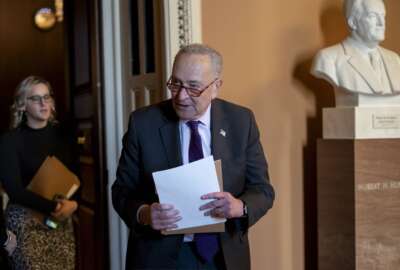
Congress buys a little time to negotiate on the budget
Now the government funding-lapse deadline is a couple of days before Christmas. This after the Senate sent a week-long extension of the continuing resolution to the...
Best listening experience is on Chrome, Firefox or Safari. Subscribe to Federal Drive’s daily audio interviews on Apple Podcasts or PodcastOne.
Now the government funding-lapse deadline is a couple of days before Christmas. This after the Senate sent a week-long extension of the continuing resolution to the White House last last week. To delved deeper into what to expect, the Federal Drive with Tom Temin spoke with WTOP Capitol Hill Correspondent Mitchell Miller.
Interview transcript:
Tom Temin
So what can we expect now? So a week is nice, but that means the shutdown comes on Christmas.Mitchell Miller
That’s right, we just have a few days to sort out this little matter of $1.7 trillion in spending in this omnibus bill, which is about what it’s going to be. One of the big things in light of last week’s attack by Russia on Ukraine will of course be more funding for Ukraine. That’s a huge part of this. Republicans as well as Democrats both support more aid for Ukraine, in light of everything that’s happening there. It’s going to be close to $37-$38 billion for Ukraine. And they want to do that because many, including Republicans, are concerned about what might happen in the House next year, which is only a little over a week away, when the Republicans take over. And many Republicans, as you know, have said in the House that they don’t want to write this blank check, as they say, for Ukraine. So that will be one of the big things. And then there are a lot of other things that are all piled in there. During that argument over the short term, week long one that just was passed last week, there was a lot of discussion about the fact that as we always hear every year among opponents of that, that they’re crushing all of this, and nobody’s going to be able to read this several thousand pages of appropriations over the next few days. So you’re gonna hear some more grumbling about that. But it also includes some provisions that are of interest, like the Electoral Count Act, which basically would close some loopholes that we found on January 6. They want to include that. The President also wants to include billions of dollars in COVID funding; there is opposition and pushback from many Republicans on that. And then just all the, of course, dozen of appropriations bills that have to get done. So certainly a ton of work that has to get done over the next few days.Tom Temin
Sure. The military is well known to be against continuing resolutions, because they need to keep going with a lot of starts of programs. But also Veterans Affairs is piping up, because their all-important infrastructure plan can’t happen without an actual appropriation for the fiscal year.Mitchell Miller
Right They were basically telling members of Congress last week that the VA, if they are going to do what members of Congress want them to do, which is make these continual improvements in the VA, if they’re going to expand their network of health care facilities across the country, and they’re going to improve this infrastructure, they need to know what kind of level of funding they’re going to be dealing with. And they really want to get this new infrastructure plan to members of Congress in the first half of the coming year. It’s going to have a whole new set of footprints for facilities across the country. They’re calling many of these expansions historic. They really wanted to do this under the PACT Act. And right now, they are still kind of waiting to see what kind of level of funding they’re going to get. And then of course, as you alluded to, with the Pentagon, Defense Secretary Lloyd Austin has essentially said that a CR, if they had to get to that yet again, would basically be a budget cut for the Defense Department because they would be maintaining those levels at the current rate. And they just don’t want to do that. They say that it gets them behind on a variety of programs. And they do have a lot of support in the congressional leadership from Democrats and Republicans. You’ll recall in the NDAA that was also passed last week, that it was a total of $858 billion. It was actually much more than what President Biden had proposed. So even though there have been a lot of complaints among Republicans about too much spending, there’s also some pretty solid support among at least a sector of the Republican Party for a strong defense and making sure that they get the funding they need.Tom Temin
We’re speaking with Mitchell Miller, Capitol Hill correspondent for WTOP. And the NDAA had a few interesting provisions as well, too, didn’t it?Mitchell Miller
Right. And of course, the biggest one is one that has been fought over back and forth between Republicans and Democrats, and that is the mandatory COVID vaccines for U.S. military personnel. This was something that was really fought for by Republicans. They feel that this was a big victory for them that they finally got the Democrats to relent. Democrats are not happy about it. I talked to Senator Tim Kaine of Virginia who’s on the Armed Services Committee, he’s opposed to it, but he also knows there has to be this compromise, and push back and forth. So that one was a really big one. Republicans arguing that the vaccine requirement was essentially really hurting recruiting. And as well, in their view, punishing a lot of people, forcing them out of the military. Of course, the opposite argument from the Defense Department is that they need this for readiness. But that is a huge one. And then of course, there’s the 4.6% pay increase for military personnel that a lot of people will be paying attention to, a huge number of things, of course, in that big Defense bill. There’s also hundreds of millions of dollars for Ukraine; of course, that though will pale in comparison to what might be finally approved this week as part of the omnibus for Ukraine.Tom Temin
But it must be especially dispiriting for the military to see all of that finally passed and authorized, but yet not appropriated yet.Mitchell Miller
Right. Exactly. And that’s really what they’re waiting for. That’s always the thing, is that’s so interesting about the NDAA is that it’s all set out there. Yes, we want to do this for you. But it hasn’t actually been appropriated yet. So they’re still waiting.Tom Temin
And you spoke with, you brought him up briefly here, Senator Tim Kaine of Virginia has been philosophically thinking about this failure to get the budget done each year.Mitchell Miller
Right, so it’s deja vu all over again, to quote Yogi Berra. And every year we of course, get to this point where it seems we’re pushing up against the holidays. They need this artificial deadline, because they just can’t get it done. And in Tim Kaine’s viewpoint, he argues why do you always have a fiscal year that’s based on October 1 through the fiscal year? Why don’t you actually match it to the calendar year? He said, you know we’re going to go through this every year otherwise. So he has pushed for a long time to somehow change that. I really don’t think, however, that there is just enough support, Congresswide, to do that, for whatever reason. Obviously, that would require a huge number of changes, and a real different mindset, frankly, for the federal government and for lawmakers. But he just argues that there’s no reason that we have to be dealing with this push right up to the holidays every single year. And you get complaints too, from Republicans, as well. Mike Lee, from Utah making the argument last week, why do we have to wait and see what the printout of this budget is going to be just days ahead of when we’re going to vote on it. And lawmakers from both sides admit that there’s no way that they and even their staffs can really fully digest and read the entire legislation before it actually it gets voted on.Tom Temin
And 40 or 50 years ago, I forget the precise date, the fiscal year started July 1. And most of the states have a calendar year fiscal year. And so the federal government could push it, I guess, to January 1, that still gives you the issue of Christmas time, I guess. But then it would drift from there. And then we’d be in March, right.Mitchell Miller
And the other part of it is to is that because of the way the House and the Senate operate, the House, generally — even though it can be highly disorganized at times and pretty volatile — they generally on that side of the aisle, members of both parties get the appropriations bills pretty much done. I mean, most of these bills were done on the House side earlier in the year. But then we get to the Senate and they hadn’t done any of this, really until the last couple of weeks. Of course they’ve been negotiating throughout the year. But it’s nothing like what is done in the House. So the people on the House side say, hey, if the Senate could get this done, like we do, we could probably meet some of these deadlines, or at least get a lot closer to them.Tom Temin
And finally, you’re seeing a lot of the retrospectives being written and published about [House] Speaker Nancy Pelosi (D-Calif.), soon to not be speaker. She’s still a member of Congress, though. Right?Mitchell Miller
Exactly. And it’s interesting. She had a news conference last week where she was asked some of these questions about kind of what her legacy is. And it’s interesting, because, talking about these legislative issues, very nitty gritty things, she was asked a question. Somebody said, we know you’re an appropriator, which she often reminds us at our news conferences, and she said, I like to be called a longstanding appropriator. She really has kind of an old school pride in the fact that she has — whether you agree with her or disagree with her on the political ledger — she dives really deep into legislation, and she has sat on these committees, she’s grinded out legislation over the years. I mean, she really does know actually what’s in the legislation. Oftentimes, as you know, a lot of legislators don’t really know what’s in the legislation. But I think that’s one of the things that she’s most proud about is that she really got in there and dug deep on some of these issues. And then more broadly, she said that the Affordable Care Act, which she worked on, she said, really, that’s the thing that she’s most proud about, because she feels like it has the most broad impact on whether or not people actually get expanded health care. She was asked a question about whether or not she would pledge to finish out her regular congressional term and she really bristled at that, acting as if she was kind of upset about it, indicating that she wasn’t even going to answer that, suggesting that she’s definitely going to serve out her term as a quote unquote, regular member of Congress. Of course, she will be the first among equals, obviously, as they try to get through some of these budget issues we just talked to.Tom Temin
Yes. We don’t have back benches in our legislature, but that’s where she would be if this was that system.
Copyright © 2025 Federal News Network. All rights reserved. This website is not intended for users located within the European Economic Area.
Tom Temin is host of the Federal Drive and has been providing insight on federal technology and management issues for more than 30 years.
Follow @tteminWFED
Related Stories





